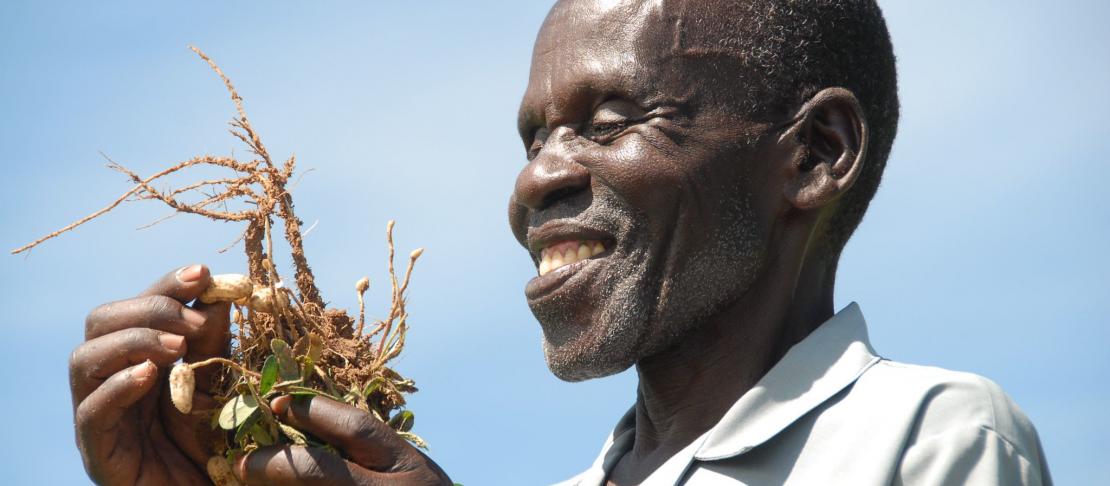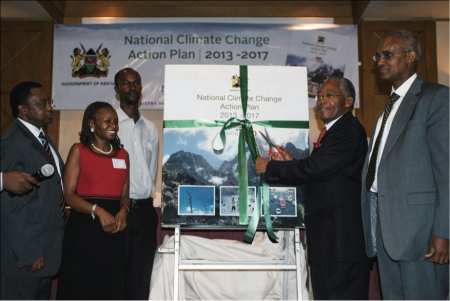Climate action in Kenya: New national plan launched

by Vivian Atakos
Kenya recently launched the National Climate Change Action Plan (NCCAP) that will guide the transition of the country towards a low carbon climate resilient development pathway.
The plan further encourages people centered development, ensuring that climate change actions support the achievement of Kenya’s development goals.
The launch took place at the Hotel Intercontinental in Nairobi on 27 March 2013. Government officers, researchers, development partners, academia and civil society groups active in environment and climate change issues attended the highly publicized event.
The idea, to develop an Action Plan for Kenya was conceived in December 2009 during COP 15 in Copenhagen Denmark. During this event, Kenya showcased the National Climate Change Response Strategy (NCCRS). The launch of the NCCAP is therefore an important milestone in Kenya’s attempt to tackle climate change issues.
The action plan operationalizes the NCCRS, launched in 2010, which recognizes the importance of climate change impacts for Kenya’s economic growth. It further, supports efforts towards the implementation of the constitution and the attainment of Vision 2030.
Kenya’s Vision 2030 is the national long-term development blue-print that aims to transform the country into a newly industrializing, middle-income country providing a high quality of life to all its citizens by 2030 in a clean and secure environment.

“The NCCAP is the logical next step to enable Kenya to reduce vulnerability to climate change and to improve the country’s ability to take advantage of the opportunities that climate change offers,” said Hon. Chirau Ali Mwakwere, the Minister for Environment and Mineral Resources, during the launch.
The Minister further noted that Kenya continues to take bold measures to secure the country’s development against the risks and impacts of climate change. Such measures include introducing a range of low carbon options such as renewable energy, more efficient use of biomass and sustainable land use management.
James Kinyangi, our East Africa Regional Program Leader, was a member of the thematic working groups that developed the plan. Working with other members, James gave input to the adaptation subcomponent that identifies priority, immediate, medium, and long-term adaptation actions in order to develop a National Adaptation Plan.
The NCCAP provides an in-depth analysis of 8 subcomponents that are independent but interrelated. These sub-components are:
- Long term national carbon climate resilient development pathway,
- Enabling policy and regulatory framework,
- Adaptation analysis and prioritization,
- Mitigation and nationally appropriate mitigation actions (NAMAs),
- Technology,
- National performance and benefit measurement,
- Knowledge management and capacity development,
- Finance.
James also advised the thematic group developing the NAMAs especially on the role agriculture can play to mitigate climate change. His participation provided the crucial link of science to policy as his input was informed by Participatory Action Research (PAR) interventions currently ongoing in various East Africa sites.
In his concluding remarks Honorable Mwakwere called on the global community to be decisive and to conclude the comprehensive and fairly legal binding agreements applicable to all by 2015. These agreements will come to force by 2020 as agreed by the United Nations Framework Convention on Climate Change (UNFCCC). “Intervention actions are costly, but the solutions are within our reach,” noted Mwakwere.
In 2013, CCAFS will be working with the Government of Kenya to promote integrated planning and implementation with focus on agricultural investments that build resilience to climate change.
This story was written by Vivian Atakos, Communications Officer for CCAFS East Africa regional office. Follow East Africa on Twitter: @Cgiarclimate_ea